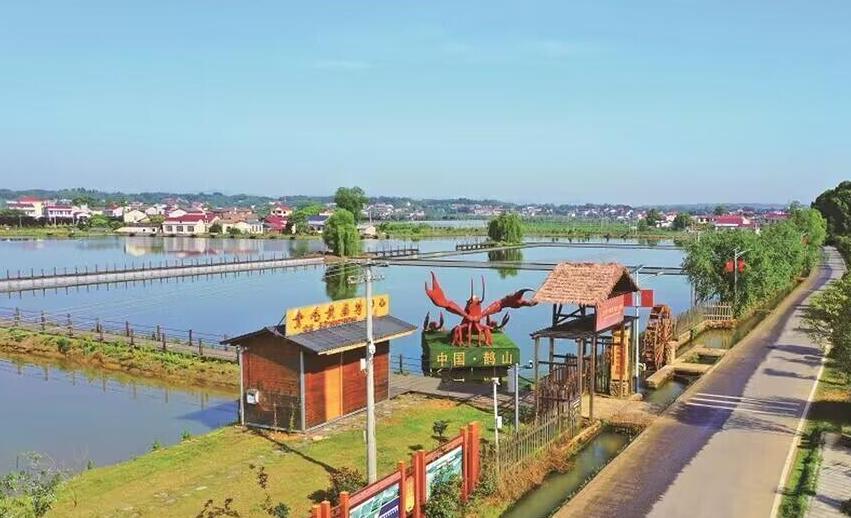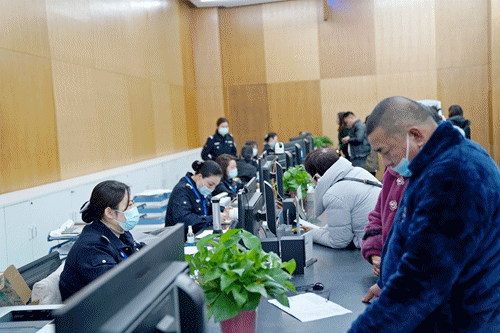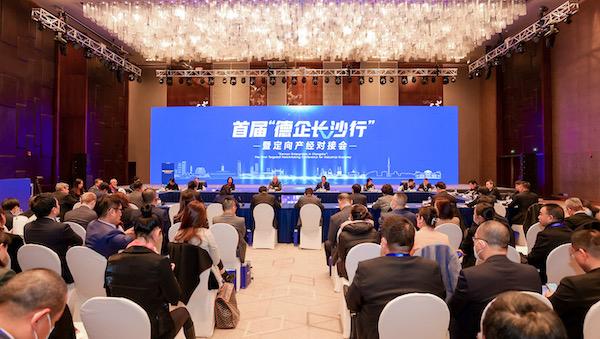Meitanba Town with beautiful landscape and thriving industries
Photos of Meitanba Town in Ningxiang City show its peaceful and beautiful scenery: dairy cows frolic on the verdant Shuanglong Pasture; villagers are busy transplanting saplings at the Torreya-grandis Plantation Base that covers an area of 200 hectares; at the Zhushantang Industrial Site Park coal mining tools such as rusty mining carts, mine derricks and chimneys tell old stories; in the “Spring Time” Party-building Cultural Park tourists have a good time visiting the gallery of red culture and savoring delicious local food.

Meitanba Town, which has been known as “a hundred-year-old city of coal mining”, took a path of transformation development with its mines shut down in 2014. It has turned into a colorful and lively home from an originally old mining area characterized by dark coals.
Dairy farm built on barren land
“Cows can produce superior milk only when they are guaranteed a comfortable life.” In the Shuanglong Village, Meitanba Town, the Shuanglong Pasture invested by Hunan Ushi Dairy Co. Ltd. with a volume of 100 million yuan is surrounded by hills and shaded by trees, providing a natural paradise for dairy cows.
Li Jianquan, head of the pasture jokingly said that those Holstein cows native to New Zealand are cultivated by him to be civilized and follow the queuing rules.
It is interesting to see that when it comes to the set milking time cows would queue up being milked and then go back to their barns in order.
Covering an area of about 24 hectares, the Shuanglong Pasture is home to 1,500 cows and includes an afforested square, a cultural park, a milking site, barns, a feed storage and a waste treatment area with the surrounding land of about 134 hectares used for planting grass.
It is a comprehensive pasture that integrates ecological plantation, cultivation and popularization of milk culture, which becomes a model for industry-tourism development and rural revitalization in Meitanba Town.
“Cows live on silage, hay and concentrated feed which together cost a relatively high fee of about 100 yuan per cow every day.” Mr. Li said that in addition to part of the feed exported from other provinces or even foreign countries, it is mostly corn and alfalfa grass planted by households and cooperatives nearby, which means that it also creates jobs for local people. 18 villagers have been lifted out of poverty by working here.
Jia Xiuping, for example, is one of those who can earn over 3,500 yuan per month by feeding and doing sanitation work in the pasture.
At the milking site, workers first install the milking equipment and then by simply pressing the switch, cows that have been sterilized and disinfected are milked within 15 minutes.
“One cow in our pasture produces an average of 34 kilograms of milk a day and more than 10 tons a year which are worth 48,000 yuan at the current market price,” introduced Zeng Xiaoheng, a technical consultant.
Making full use of the resources of the pasture and base, Shuanglong have been developing the beautiful countryside construction and pasture sightseeing tourism, which helps 600 households increase income.
Beautiful natural villages surrounded by flourishing plants
Meitanba Town was once rich in coal resources, whose mining can be traced back to the Ming dynasty. Hunan Meitanba Energy Co. Ltd., the predecessor of Changsha Mining Group and then top 100 coal enterprises, and the largest township coal mine in Hunan were located here.
The bituminous coals produced, with such merits as high calorific value and low ash content, sell good in Hunan, Hubei, Guangdong, Guangxi, Jiangsu and Zhejiang. Its booming coal industry directly promotes the development of the local tertiary industry.
While striding forward on the development path of industrial transformation, the town has also realized it is necessary to protect its ecology. It has taken efforts to improve farmland, manage mining subsidence areas and build the beautiful countryside.
Walking in Hejiawan Village which was awarded “the Demonstration Village of Beautiful Countryside in Hunan”, you are exposed to the beautiful countryside landscape—asphalt roads lead to each cottage, roads and farmland are well managed, and newly built natural villages are surrounded by verdant plants.
There is a widely-known torreya grandis plantation base with thousand-year-old trees. After Ningxing City designated it as “the tree of the city”, Hejiawan Village has attracted more than 20 million yuan of investment to cultivate the trees.
Cui Changqian, head of the involved company said that they have the plan to develop a sapling cultivation base that covers an area of 200 hectares in order to promote the tree variety across the province.
Villagers are busy working in the Shenglin Ecological Park. It is going to be built into a comprehensive agricultural ecological sightseeing park with an investment of 30 million yuan spent on potted flowers, vegetable planting, fruiting picking and team research.
“The project can create about 200 jobs per year for villagers and help each of them earn about 100,000 yuan a year,” said Cai Ding, head of the park project.
“Blooming golden chrysanthemums attract crowds of tourists to take photos.” In Dongshan Village, Meitanba Town people are immersed in the beautiful scenery and good harvest.
“Encouraged by the national call for rural revitalization, I am determined to make the Huazhi Chinese Herbal Medicine Industrial Park more flourishing,” said Liu Jizhang, head of the Huazhi Agricultural Science and Technology Development Company who transferred a piece of permanent fallow land in Dongshan Village for planting 74-hectare rosemary and golden chrysanthemum and developing co-cultivation of lotus and fish, fruit and vegetable sightseeing.
The new agricultural farm in this park is full of vitality now.
More than 200 villagers would be involved in chrysanthemum picking at the peak season, which can help increase their average income by 18,000 yuan.
“Flowers and herbal medicines boost tourism and agricultural development.” Mr. Liu said that the industrial park is to be expanded to more than 133 hectares in 2022 when experts from colleges and universities will be invited to conduct research on Chinese herbal medicines, which will promote the herbal medicine industry chain and increase the income of local farmers.

Meitanba Town, which has been known as “a hundred-year-old city of coal mining”, took a path of transformation development with its mines shut down in 2014. It has turned into a colorful and lively home from an originally old mining area characterized by dark coals.
Dairy farm built on barren land
“Cows can produce superior milk only when they are guaranteed a comfortable life.” In the Shuanglong Village, Meitanba Town, the Shuanglong Pasture invested by Hunan Ushi Dairy Co. Ltd. with a volume of 100 million yuan is surrounded by hills and shaded by trees, providing a natural paradise for dairy cows.
Li Jianquan, head of the pasture jokingly said that those Holstein cows native to New Zealand are cultivated by him to be civilized and follow the queuing rules.
It is interesting to see that when it comes to the set milking time cows would queue up being milked and then go back to their barns in order.
Covering an area of about 24 hectares, the Shuanglong Pasture is home to 1,500 cows and includes an afforested square, a cultural park, a milking site, barns, a feed storage and a waste treatment area with the surrounding land of about 134 hectares used for planting grass.
It is a comprehensive pasture that integrates ecological plantation, cultivation and popularization of milk culture, which becomes a model for industry-tourism development and rural revitalization in Meitanba Town.
“Cows live on silage, hay and concentrated feed which together cost a relatively high fee of about 100 yuan per cow every day.” Mr. Li said that in addition to part of the feed exported from other provinces or even foreign countries, it is mostly corn and alfalfa grass planted by households and cooperatives nearby, which means that it also creates jobs for local people. 18 villagers have been lifted out of poverty by working here.
Jia Xiuping, for example, is one of those who can earn over 3,500 yuan per month by feeding and doing sanitation work in the pasture.
At the milking site, workers first install the milking equipment and then by simply pressing the switch, cows that have been sterilized and disinfected are milked within 15 minutes.
“One cow in our pasture produces an average of 34 kilograms of milk a day and more than 10 tons a year which are worth 48,000 yuan at the current market price,” introduced Zeng Xiaoheng, a technical consultant.
Making full use of the resources of the pasture and base, Shuanglong have been developing the beautiful countryside construction and pasture sightseeing tourism, which helps 600 households increase income.
Beautiful natural villages surrounded by flourishing plants
Meitanba Town was once rich in coal resources, whose mining can be traced back to the Ming dynasty. Hunan Meitanba Energy Co. Ltd., the predecessor of Changsha Mining Group and then top 100 coal enterprises, and the largest township coal mine in Hunan were located here.
The bituminous coals produced, with such merits as high calorific value and low ash content, sell good in Hunan, Hubei, Guangdong, Guangxi, Jiangsu and Zhejiang. Its booming coal industry directly promotes the development of the local tertiary industry.
While striding forward on the development path of industrial transformation, the town has also realized it is necessary to protect its ecology. It has taken efforts to improve farmland, manage mining subsidence areas and build the beautiful countryside.
Walking in Hejiawan Village which was awarded “the Demonstration Village of Beautiful Countryside in Hunan”, you are exposed to the beautiful countryside landscape—asphalt roads lead to each cottage, roads and farmland are well managed, and newly built natural villages are surrounded by verdant plants.
There is a widely-known torreya grandis plantation base with thousand-year-old trees. After Ningxing City designated it as “the tree of the city”, Hejiawan Village has attracted more than 20 million yuan of investment to cultivate the trees.
Cui Changqian, head of the involved company said that they have the plan to develop a sapling cultivation base that covers an area of 200 hectares in order to promote the tree variety across the province.
Villagers are busy working in the Shenglin Ecological Park. It is going to be built into a comprehensive agricultural ecological sightseeing park with an investment of 30 million yuan spent on potted flowers, vegetable planting, fruiting picking and team research.
“The project can create about 200 jobs per year for villagers and help each of them earn about 100,000 yuan a year,” said Cai Ding, head of the park project.
“Blooming golden chrysanthemums attract crowds of tourists to take photos.” In Dongshan Village, Meitanba Town people are immersed in the beautiful scenery and good harvest.
“Encouraged by the national call for rural revitalization, I am determined to make the Huazhi Chinese Herbal Medicine Industrial Park more flourishing,” said Liu Jizhang, head of the Huazhi Agricultural Science and Technology Development Company who transferred a piece of permanent fallow land in Dongshan Village for planting 74-hectare rosemary and golden chrysanthemum and developing co-cultivation of lotus and fish, fruit and vegetable sightseeing.
The new agricultural farm in this park is full of vitality now.
More than 200 villagers would be involved in chrysanthemum picking at the peak season, which can help increase their average income by 18,000 yuan.
“Flowers and herbal medicines boost tourism and agricultural development.” Mr. Liu said that the industrial park is to be expanded to more than 133 hectares in 2022 when experts from colleges and universities will be invited to conduct research on Chinese herbal medicines, which will promote the herbal medicine industry chain and increase the income of local farmers.

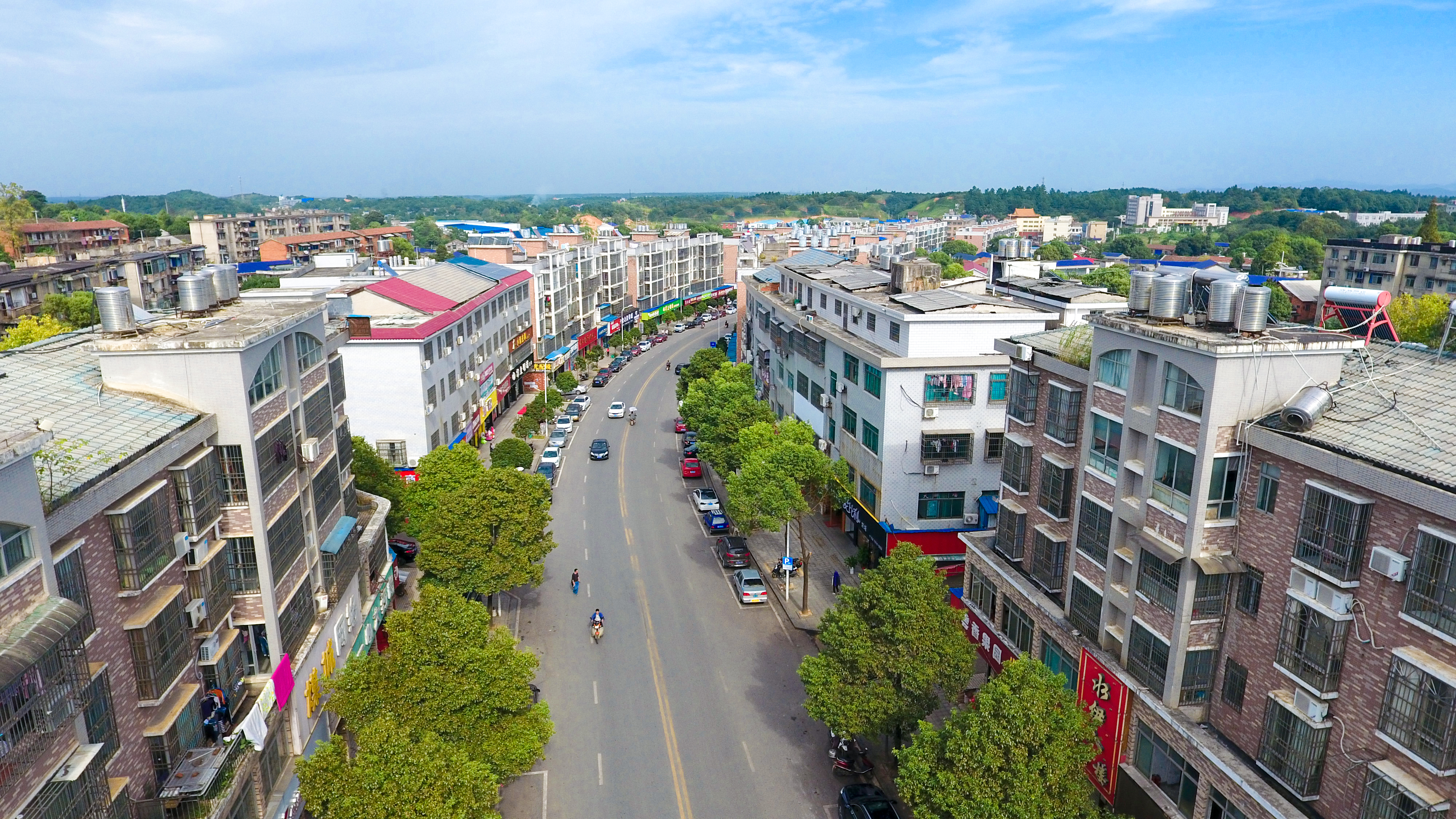 Ningxiang listed on China’s top 100 counties with comprehensive competitiveness
Ningxiang listed on China’s top 100 counties with comprehensive competitiveness  College welcomes a student of courage
College welcomes a student of courage 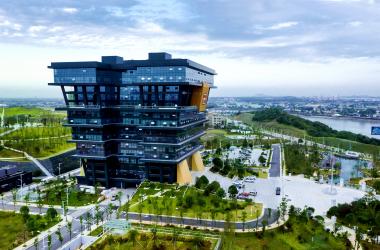 Changsha Blue Moon Valley Intelligent Home Appliances Industrial Town
Changsha Blue Moon Valley Intelligent Home Appliances Industrial Town 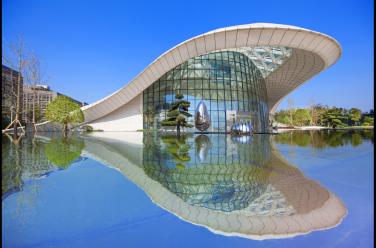 This is Ningxiang High-tech Zone
This is Ningxiang High-tech Zone 